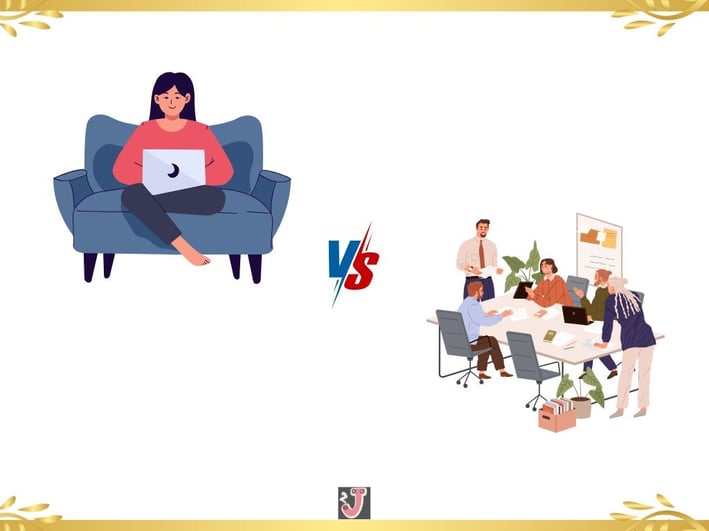Which Is Better: Working From Home or the Office?
A work from home guy shares his take on which is better between working from home or in the office.
WORK FROM HOME
Jan Evets
7/18/20254 min read
Which Is Better: Working From Home or the Office?


It really depends on your situation. The best setup for you comes down to the kind of work you do—and how you function best as a person.
Hi, I’m Jan. I’ve been working remotely for six years now. Aside from a short on-the-job training stint in high school, I haven’t spent time in an office. So I’ll be upfront: this might not be the most perfectly balanced take. But I’ll try to be as objective as possible.
I’m not here to convince you that one is better than the other anyway. My goal is to help you get a clearer picture. If you’re thinking of switching from an office job to a WFH VA role (or the other way around), this one’s for you
Why Each Setup Has Its Advantages
There are two things we need to look at here: your welfare and your company’s interests.
Let’s start with you.
You want to feel comfortable, stay productive, and get things done efficiently. And you can absolutely check those boxes from home—if you’ve got the right working setup. That means a capable PC, a proper desk and chair, a well-ventilated room, and ideally, minimal distractions. Depending on your job, you might need more, but you get the idea.
But it’s not just about tools and furniture. Your character matters too.
Working from home often means working alone. Are you cool with that? Or do you thrive when you're physically around people? Personally, as an introvert, I’m good with it. I like the quiet and I get nervous talking to new people. But it’s not for everyone.
Now, let’s talk productivity.
I’ve got a decent office setup at home, and there’s nothing really stopping me from being productive—except me. I do get distracted by social media and games every now and then. That’s the trade-off. Working online gives you more freedom, but it also requires more discipline.


Is it better for employees to work from home?
If the job allows for it and the company supports remote work properly, then yes—for many people, WFH is a great setup. But it still depends on your personality and how you manage your time.
Which type of work-from-home job is best?
Anything that can be done with a PC (or a tablet, for all you designers) and a solid internet connection is fair game. But really, it depends on your skills and what kind of work excites you.
Is working from home more effective?
It can be—if you’ve got the right equipment, environment, mindset, and routines. You need self-discipline, focus, and a clear boundary between work and rest.
Are people happier working from home or in the office?
Good question.
Sometimes I feel isolated working from home, but a quick vacation usually resets my mood, lol. I love the flexibility WFH gives me—I can work out, rest when I need to, and manage my time better. But again, it depends on your lifestyle and what makes you feel fulfilled
How Employers See It


FAQs
Now let’s flip the perspective and look at things from an employer’s point of view.
As long as you’re doing your work, hitting deadlines, and staying communicative, many employers are cool with remote setups. In fact, working from home can save both you and your company money. No commuting costs for you. No office space to maintain for them. Win-win, right?
But that’s not always the case.
In the Philippines, electricity and internet bills can feel heavy—especially when compared to average local wages. That said, once you’re working with international clients, the currency exchange rate helps a lot. Even local clients can pay well, especially if you’re offering valuable skills.
When Working Onsite Makes More Sense
There are situations where working in an office just makes more sense.
If your job requires physical presence—say, handling equipment, face-to-face customer service, or access to secure systems—then onsite is a no-brainer. Also, some people just enjoy being around coworkers, and there’s nothing wrong with that.
Some companies also prefer onsite employees, especially when they care about things like:
Team collaboration and communication
Building a strong company culture
Data security and confidentiality
Easier supervision and faster feedback loops
So yeah, it’s not just about productivity. It’s about the kind of business they run and how they want their team to operate.
Final Thoughts
It’s a case by case basis, you know. The key is figuring out what works best for you and your goals. Whether you're doing great in your home office or loving the work that you do onsite, both setups have their pros and cons. If, for example, you want to spend time with your family more or prioritize your health then working from home might be a really good option.
On the flipside, if you're goal is to learn a business, say construction or manufacturing, then working for a relevant company to learn the ins and out of the trade make sense.
And if you ever find yourself stuck in the middle, remember—you can always test both and see what clicks. Just be smart and plan it out first!
